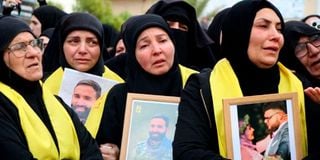Premium
Israeli airstrike kills Hezbollah fighter in south Lebanon

Mourners react during the funeral procession of a Hezbollah fighter and two of his relatives who were killed in Israeli bombardment the previous night, in Bint Jbeil, in southern Lebanon near the border with Israel, on December 27, 2023, amid ongoing cross-border tensions as fighting continues between Israel and Hamas militants in Gaza.
What you need to know:
- The Australian government said two Australian citizens had been killed in the airstrike, without identifying them by name.
- On the Israeli side, at least four civilians and nine soldiers have been killed, according to figures from the military.
An Israeli strike in south Lebanon killed a Hezbollah fighter, the group said Wednesday, as state media reported two of his relatives were also killed and the Iran-backed movement launched rockets in retaliation.
The border between Lebanon and Israel has seen escalating exchanges of fire, mainly between the Israeli army and Hamas ally Hezbollah, since the Israel-Hamas war began on October 7, raising fears of a broader conflagration.
"Enemy warplanes raided, before midnight (2200 GMT), a house... in the centre of the town of Bint Jbeil," around two kilometres (a little over a mile) from the border, killing a man, his brother and his wife, Lebanon's National News Agency (NNA) said.
The NNA identified the dead as Ali Bazzi, his brother Ibrahim and his wife Shourouk Hammoud, and said another family member was wounded.
Hezbollah later announced that Ali Bazzi was one of its fighters.
A relative told AFP that Ibrahim Bazzi was an Australian citizen who had flown in for a visit about a week earlier.
The Australian government said two Australian citizens had been killed in the airstrike, without identifying them by name.
Australia's attorney general, Mark Dreyfus, urged Australians to leave Lebanon while commercial flights were still operating.
At the funeral procession in Bint Jbeil on Wednesday, an AFP photographer saw three coffins draped in Hezbollah flags.
Hassan Fadlallah, a lawmaker from the Iran-backed group, told the ceremony that "no crime against civilians will pass without the enemy paying the price".
Hezbollah later Wednesday said it launched a barrage of 30 Katyusha rockets towards Kiryat Shmona in northern Israel "in response to the enemy's repeated crimes and its targeting of civilian houses in Bint Jbeil".
Since the cross-border hostilities began, more than 150 people have been killed on the Lebanese side, most of them Hezbollah combatants but also more than 20 civilians, three of them journalists, according to an AFP tally.
On the Israeli side, at least four civilians and nine soldiers have been killed, according to figures from the military.
Exchanges of fire have been largely confined to the border area, although Israel has conducted limited strikes deeper into Lebanese territory.
Hezbollah said Wednesday it carried out a series of other attacks on Israeli troops and positions, including one on the contested Shebaa Farms involving "suicide drones", missiles and artillery.
The Israeli military said in a statement that "a number of launches were identified crossing from Lebanon toward various areas in northern Israel", adding that the army struck the sources of fire and "additional areas in Lebanon".
It also said "fighter jets" struck "terrorist infrastructure, as well as Hezbollah military sites".
Lebanon's NNA reported Israeli strikes in various areas along the southern border.
On Tuesday, Israel's military said an anti-tank missile fired by the Shiite Muslim group wounded nine soldiers as they went to assist a civilian wounded in an earlier strike.
Israel has been pushing for Hezbollah to withdraw north of the Litani River, which lies about 30 kilometres (20 miles) north of the border.
UN Security Council Resolution 1701, which ended a 2006 war between Israel and Hezbollah, called for the removal of armed personnel south of the Litani, except for UN peacekeepers and the Lebanese army and state security forces.
Prime Minister Najib Mikati said last week that Lebanon was ready to implement international resolutions that would help end Hezbollah's cross-border attacks if Israel also complies and withdraws from disputed territory.





